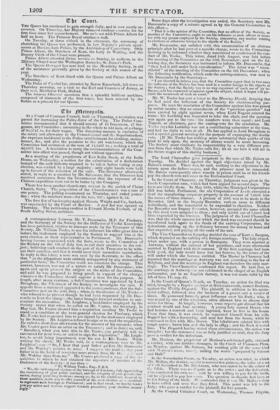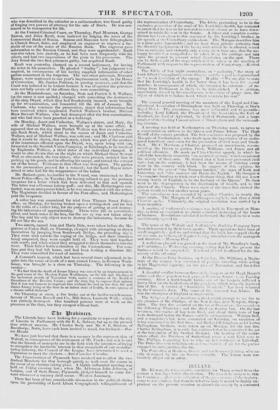The Lord Chancellor gave judgment in the case of Mr.
Baines on Tuesday. Ile decided against the legal objections raised by Mr. Baines's counsel. There was, he said, nothing in the objections to the return upon the habeav corpus, mid the prisoner must be remanded. Mr. Baines consequently must remain in prison until he or his friends pay the church-rate and costs in the Ecclesiastical Court.
In the Court of Chancery, on Thursday, judgment was given in the Leeds Corporation case, which had been argued for several days. The facts are briefly these. In May 1835, while the Municipal Corporations Bill was before Parliament, the old Corporation of Leeds executed a deed for transferring corporate property to the amount of 7,000/. into the names of three trustees. A present of 500/. was to be made to the Recorder, 1201. to the Deputy Recorder, various sums to different individtaids, and the remainder to be expended in charities. Neither the Recorder nor Deputy Recorder, however, accepted the sums which by this deed were assigned to them • and only 3,000/, out of 7,000/. had been expended by the trustees. The judgment of the Lord Chancellor was, that the whole amount for which the deed was executed should be transferred back again to the funds of the existing Corporation, the defendants making up the deficiency between the money in hand and that expended, and paying all the costs of the suit.
The Vice-Chancellor on Saturday decided the case of Kent v. Burgess, which depended on the validity of a foreign marriage. The lady eloped, when under age, with a person in Ramsgate. They were married at Antwerp, without the consent of her guardians, and were afterwards married in England with their consent. If the first marriage had been held good, the lady would have lost her fortune, by time terms of the
will under which she became i eca
e entitled. The Master n Chancery had reported that the marriage at Antwerp was not according to the law of Belgium, and that the marriage in England was therefore the only mar- riage. The Vice-Chancellor confirmed this report. 1k held that, as the marriage at Antwerp was not celebrated in the chapel of an English ambassador, nor in an English factory, it was not made valid by the 4th of Geo. IV. cap. 81.
lit the Court of Queen's Boucle on Tuesday, on action for libel was tried, brought by a Baptist minister at ltiekmuanswortim, named Benham, against the Weehly Dispatch. The plaintiff, in addition to his minis- terial calling, followed ulso the business of a grocer end a vender of shoes. Ile possessed formerly great influence over his flock ; who, it was stated by one of the witnesses, often allowed him to choose their wives for them. At length, however, sonic reports got abroad that his conduct would not bear scrutiny. A young lady named Dover, who had become a convert and teen baptized, went to live in his house. From that thne, it was stated, he separated himself front his wife, flogged her with a horsewhip. and sent her from the house, while he continued to live with Miss Ifover. The inhabitants sainted him with rough music ; burnt him and the lady in effigy ; and his hock dcserted hint. The Dispatch having stated these circumstances, the Odium was brought ; hut the statemeht was so fully justified on trial, that that Jury gave a verdict for the defendant.
Mr. Morison, the proprbe or of Morison's celebrated pills, oh tnined a verdict, with one fart hut damages, in the Court of Common Pleas, on Monthly, against Mr. Silicon, for vending pills of' the saute kind with Morison's name, merely ading the words " prepared by Salmon and Hall."
In the Secondaries Court, on Tuesday, an action was tried, in which Mr. Malian, the dentist, sought to recover ten guineas, the value of a set 1-eth furnished to Mr. Blaek burn, who Ws SlatVli to he the editor of t:,c ;taw. There was no dispute as to the order ; and the delimlant, who eendueted his own case, said he was willing to pay for th,. teeth, Litt he objected to pay law-costs. The questiou in dispute Ind been as to the fitting of the teeth. Ile contended that it v,ets Mr. Mallae's ditty to have called and semi that they fitted. This point was left to the Jury; who gave a verdict lit:- the plaintiff, for five pounds.
I At the Central Criminal Court, on Wednesday, Thomas Pilgrim, who was described in the ealender as a cabinetmaker, was found guilty of forging two powers of attorney for the sale of Stock. Ile was sen- tenced to be transported for life.
At the Central Criminal Court, on Thursday, Paul Mazeaux, George Remus, and Jules Rauh, were indicted for forging the notes of the Commercial Bank of Russia. Ramus and Mazeaux were lithographers in Church Street, Soho, and employed an engraver to engrave a fac- simile of one of the notes of the Russian Bank. The engraver gave information to the Russian Consul, and they were apprehended: Rault was also taken into custody, as he had been seen frequently with the others, and had two impressions of the plate in his poss(ssion. The Jury found the two first prisoners guilty, but acquitted Rauh.
Rault was 7esterday charged on a second indictment, for having the notes in his possession. Ile pleaded " Guilty "; but judgment was respited, in consequence of his having supplied information of other parties concerned in the forgeries. The two other prisoners, Mezeaux Ram!, were sentenced to one year's imprisonment each, in the house of Correction. Mr. Justice Pattison, in passing sentence, said that the Court was induced to be lenient because it was of opinion the prisoners were not fully aware of the offence they were committing.
At the Mansionhouse, on Saturday, Stott and Patrick S. S. Wallace, (as the name is now spelled,) charged with concerting the destruction of the ship Dryad, which they had fraudulently insured, were brought up for reexamination, and remanded till the 4th of January. Mr. Clarkson, who conducts the prosecution, stated that information had been received which implicated Patrick Wallace's brother, Michael Shaw Stewart Wallace, who had decamped after the first examination, and who had since been gazetted as a bankrupt.
On Monday, Janet and Catherine, Wallace's sisters, ainl Mary, the wife of Michael Wallace, were brought up at the same Mike. It appeared that on the day that Patrick Wallace was first examined, cer- tain Bank Stock, which stood in the names of Janet and Catherine Wallace, and of Michael Wallace, was sold out ; and Mr. Clarkson said that it would be shown, that such stock, which was part of the produce of the insurances effected upon the Dryad, was, upon being sold out, forwarded to the Scottish Union Company, at Edinburgh, to be received by Euphemia Wallace, a third sister of the individual charged. It would be also shown that on the night or. which Michael Shaw Stewart Wallecc absconded, the two sisters, who were present, assisted him in packing up his goods, and in effecting his escape, and turned the servant out of the house. Evidence to that effect was then given. The parties to the prosecution pressed for a remand; but the Lord Mayor deter- mined to take bail for the reappearance of the ladies.
Mr. Hetherington, bookseller in the S.rand, was summoned to Bow Street Police-office, on Tuesday, for having refused to pay the postman twopence for a letter which had been delivered to hint and opened. The letter was a German lottery-puff ; and this, Mr. Hetherington con- tended, was an anonymous letter, as he was unacquainted with the writer. The Magistrate decided in favour of the Post-office, and Hetherington paid the twopence.
A sailor boy was committed for trial from Thames Street Police- office, on Monday, for having broken open a writing-desk and tin box
in the cabin of a collier brig, for the purpose of getting at and destroy- ing his indentures of apprenticeship. There were 22/. in sovereigns, silver, and bank-notes in the box, but the um cy was not taken away. The boy said his only object was to destroy the indentures, because he did not like the sea.
Two sisters, named Ann and Maria Bide, were taken before the Ma- gistrate at Union Hall, on Thursday, charged with attempting to drown
themselves by jumping front Southwark Bridge, the preceding nig!.t.
They were seen outside the coping of the bridge, and their intention being suspected, they were caught hold of. They were tied together with scarfk, cud when seized they struggled to throw themselves into the river. Their father holds a situation in the Customhouse. For some time past they had left home, and had been leading a dissolute life. They were committed for want of sureties.
A Coroner's inquest, which had been several times adjourned, to in- quire into the cause of death of a man named Lisney, iii Hendon NVork- house, was brought to a close on Thursday. The following is the verdict- " We find that the death of James Lisney was caused by an imprisonment in the gaol-room of the Iletalon Union Workhouse, on (Inc 4th and :;t11 days of the inclement month of November 1840, under a sentence of the Board of Guardians of the Hendon Union; and the Jury beg to express their opinion that it was not humane to imprison him without tire and on low diet, tine said James Lisney being at the tine: in an itffirm state of health, ill C011t,:.litiellee of a disease called diabetes."
On Thursday at noon, a fire broke out at the lueifer-match-manu- factory of Messrs. Russell and Co., Mill Street, Lambeth Walk ; which was entirely destroyed. One hundred persons were at work on the premises at the time, but they escaped without hurt.



























 Previous page
Previous page